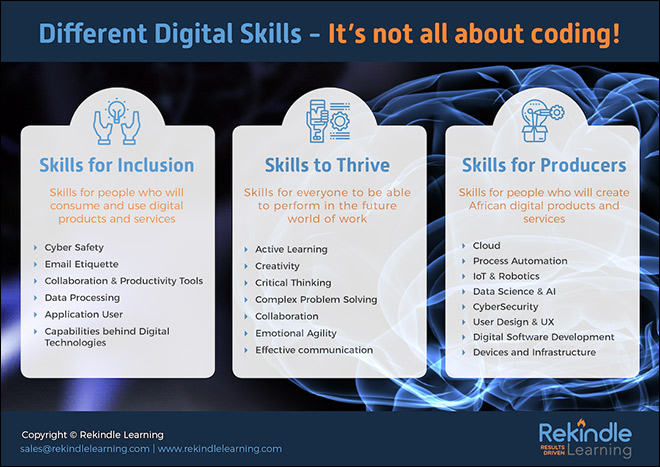
Conversations in every corner of the globe that has economic ambitions, invariably includes pressing questions of how to build a future-fit workforce. ‘Skills’ is the ticking time bomb that could stop all possibilities of the potential of the Fourth Industrial Revolution in its tracks.
The typical politically-correct response is to focus on developers, coders, and complex technical skills. But, this is short-sighted. The digital skills of the future actually differing degrees of complexity. Yes, we need coders and data scientists and other advanced technical skills. These ‘Skills for the Producers’ will drive the creation of contextually relevant innovation that will serve the interests of local communities. But it would be short-sighted to believe that that is enough. Digital skills need to a much wider spectrum: Skills for Producers, Skills for Inclusion and Skills to Thrive.

An oft overlooked fact is that the mega tech companies are successful because their local markets avidly consumed their new innovative solutions. Unless large corporates, medium businesses, the public sector and the general consumer actually buy local innovation, we won't see local innovations thrive. I believe the hindrance to local consumption lies with the buyers themselves, who need greater digital skills and awareness. You don’t know what you need, or that what you need even exists. And you are certainly less likely to buy things you don’t understand.
Unless large corporates, medium businesses, the public sector and the general consumer actually buy local innovation, we won't see local innovations thrive.
Skills for inclusion are the ones everyone needs to be able to consume and purchase digital products and services. They include being able to use applications, online communication and collaboration tools, cyber safety, information processing and a fundamental understanding of the capabilities behind digital technologies. The hardest skills required are the skills needed to thrive and for everyone to be able to adapt and perform in the future. These are skills like communication, managing people, leadership and emotional agility. These skills also include critical thinking, creativity, and problem solving.
To develop the skills to thrive, we need to recognise that our current model of learning based on knowledge-transfer is not going to cut it. The oft used (mis)quote from Charles Darwin, “
it is not the strongest species that survive, nor the most intelligent, but the most adaptable to change,” gives us some clues. Being able to adapt to change entails more transformative learning that changes mindsets, values and behaviours to enable people to become self-starters, take initiative and direct their own life outcomes. We already know that you can give a promising nursing candidate amazing content, but that doesn’t mean they will necessarily become a great nurse. What makes a great nurse is something else. That something else is about behaviours, mindsets and values. The trick to developing mindsets and behaviours has much less to do with ‘what’ we are taught (content) and more about ‘how’ we are taught through well-pitched challenges, exposure to a wide range of experiences and provocative stimulation. Unfortunately, most of our educational and human development endeavours focus on content-driven learning. Standardised testing and homogenous teaching were designed with the previous industrial revolutions in mind, when our memory and analytical function was what separated humans from every other species and machines.
We already know that you can give a promising nursing candidate amazing content, but that doesn’t mean they will necessarily become a great nurse. What makes a great nurse is something else.
We need to rather identify and focus on the core capabilities, the underlying functions of a human, through which we can change ‘what we know’ like we would a hat and then adapt. Those core capabilities could be literacy and numeracy, along with tools to think better and process information by knowing how to validate, organise, analyse, and categorise this information. Whole brain function is required to support not only analysis functions — where we zoom in to see the detail — but also synthesis functions where we zoom out to see larger patterns — when we look at the bigger picture, the why, or purpose of things. Another core capability would be creativity and problem solving. While most people think creativity is about ‘thinking out of the box,’ that typically does not work as we draw blanks when we try to think ‘out of the box.’ In fact, it is more about becoming aware of the boxes we have created in our minds and putting that thinking into different boxes. Fortunately, even adults can be trained to reconnect with their creative abilities. Lastly, and most importantly, a can-do mindset is required where people exercise an internal locus of control and innate agency to improve their life condition. One’s locus of control is external when we perceive factors outside of ourselves to be driving an outcome for a particular task, while an internalised locus of control speaks to an appreciation of the cause-and-effect relationship that allows us to self-direct and author the outcome we seek. Locus of control drives one’s degree of independence.
 The mountain that young people must climb to be future-fit has risen to dizzying heights. Illustration: Malte Mueller/Getty
The mountain that young people must climb to be future-fit has risen to dizzying heights. Illustration: Malte Mueller/Getty
The aforementioned capabilities, are truly only gained through life experiences beyond our comfort zone and challenges just beyond our current ability that stretch us and by so doing, develop our neurology. Project-based learning, internships, work experiences and stimulating home and work environments are essential here and will be sufficient for some, at least, for those who have the privilege of a manager or mentor dedicated to crafting out-of-comfort zone experiences to drive personal growth. This life experience gap goes beyond work experiences though. What about the young people who don’t have the benefit of listening and learning from their parents around the dinner table for decades, the benefit of being taken under someone’s wing and having access to conversations that inform how we make sense of the world, and the benefit of being close enough to someone to model your work and behaviour on them? The mountain that young people must climb to be future-fit has risen to dizzying heights.
While most people think creativity is about ‘thinking out of the box,’ that typically does not work as we draw blanks when we try to think ‘out of the box.’ In fact, it is more about becoming aware of the boxes we have created in our minds and putting that thinking into different boxes.
If the path to develop adaptability entails immersive experiences, then how do we create large-scale immersive and transformative learning experiences that consistently provide the right quality of experiences depending on an individual’s progress across the dimensions? Virtual Reality and Artificial Intelligence technologies present us with an opportunity to create a platform for artificially created experiences that can be consumed by millions at the same time. It provides an avenue to move from producing content to curating experiences in a manner that may not be real (in the physical sense), but can deliver most of the necessary learnings. Imagine young people preparing for an interview by undergoing several practice experiences with a computer-created human being? Or developing communication and assertiveness skills through an artificially created meeting similar to those one will find at the workplace? Or tackling a project and engaging with an artificially created client who provide feedback and respond like a real client would? Or practicing specialised technical skills? Given the skilling required for young people, it is essential to invest significantly in the use of AI and Virtual Reality tools to artificially create the experiences that will provide the required stimulus to develop young people’s minds.
The 4IR is challenging us by putting into question what it means to be human. We can take actions now to ensure that new digital technologies help, and not hinder, humanity’s future. The only limitation here is our imagination and how well we can use these tools to build a world that serves our mutual interests.
Emerging research predicts that AI will create more jobs than it makes obsolete. It is easy to feel the loss of what was, when you can't imagine what will be, but a limitation of imagination doesn't mean there won't be new opportunities. This industrial revolution, like the ones before it, will push us to direct our energies to what we are actually better at.
The views expressed above belong to the author(s). ORF research and analyses now available on Telegram! Click here to access our curated content — blogs, longforms and interviews.



 Conversations in every corner of the globe that has economic ambitions, invariably includes pressing questions of how to build a future-fit workforce. ‘Skills’ is the ticking time bomb that could stop all possibilities of the potential of the Fourth Industrial Revolution in its tracks.
The typical politically-correct response is to focus on developers, coders, and complex technical skills. But, this is short-sighted. The digital skills of the future actually differing degrees of complexity. Yes, we need coders and data scientists and other advanced technical skills. These ‘Skills for the Producers’ will drive the creation of contextually relevant innovation that will serve the interests of local communities. But it would be short-sighted to believe that that is enough. Digital skills need to a much wider spectrum: Skills for Producers, Skills for Inclusion and Skills to Thrive.
Conversations in every corner of the globe that has economic ambitions, invariably includes pressing questions of how to build a future-fit workforce. ‘Skills’ is the ticking time bomb that could stop all possibilities of the potential of the Fourth Industrial Revolution in its tracks.
The typical politically-correct response is to focus on developers, coders, and complex technical skills. But, this is short-sighted. The digital skills of the future actually differing degrees of complexity. Yes, we need coders and data scientists and other advanced technical skills. These ‘Skills for the Producers’ will drive the creation of contextually relevant innovation that will serve the interests of local communities. But it would be short-sighted to believe that that is enough. Digital skills need to a much wider spectrum: Skills for Producers, Skills for Inclusion and Skills to Thrive.
 An oft overlooked fact is that the mega tech companies are successful because their local markets avidly consumed their new innovative solutions. Unless large corporates, medium businesses, the public sector and the general consumer actually buy local innovation, we won't see local innovations thrive. I believe the hindrance to local consumption lies with the buyers themselves, who need greater digital skills and awareness. You don’t know what you need, or that what you need even exists. And you are certainly less likely to buy things you don’t understand.
An oft overlooked fact is that the mega tech companies are successful because their local markets avidly consumed their new innovative solutions. Unless large corporates, medium businesses, the public sector and the general consumer actually buy local innovation, we won't see local innovations thrive. I believe the hindrance to local consumption lies with the buyers themselves, who need greater digital skills and awareness. You don’t know what you need, or that what you need even exists. And you are certainly less likely to buy things you don’t understand.
 The mountain that young people must climb to be future-fit has risen to dizzying heights. Illustration: Malte Mueller/Getty
The mountain that young people must climb to be future-fit has risen to dizzying heights. Illustration: Malte Mueller/Getty PREV
PREV

